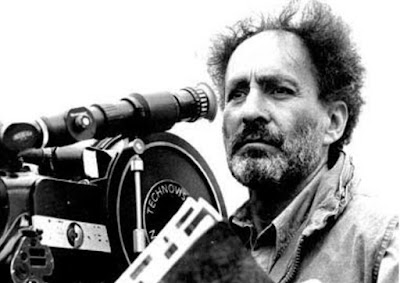Monte Hellman, who has died aged 91, was a writer-director working on Hollywood’s fringes who achieved semi-legendary status among cinephiles, in part due to a filmography consisting almost exclusively of cult items.
The most notable of these
was Two-Lane Blacktop (1971), an anti-road movie that crystallised
American anomie at the moment of Vietnam. Backed by Universal to replicate Easy
Rider’s success, the finished feature proved perverse indeed. Its cross-country
drag race proposed that speeding could be as enervating as sitting still; the inexperienced
leads, singer James Taylor and Beach Boys drummer Dennis Wilson, gave muted
performances.
After studio chief Lew
Wasserman pulled all promotion, decrying the film as “subversive”, it fell into
obscurity, and remains contentious: David Thomson damns it as “elliptical,
oblique and equivocal, marred by its own lofty intransigence toward audiences”.
Yet these were precisely the qualities that led buffs to rediscover and treasure
it, and its critique of American mythmaking went far beyond Easy Rider: its
big finish was the film stock burning up before our eyes.
That high-profile
flameout prompted a fallow period, although Hellman returned to prominence two
decades later when longtime fan Quentin Tarantino sought his opinion on the
script for Reservoir Dogs (1992). Noting how keen the younger man was to
direct, Hellman assumed executive producer duties, fundraising the launchpad
for one of modern American cinema’s most prominent careers.
In doing so, Hellman
bridged two generations of indie filmmakers, but he surely observed the rise of
Tarantino, a fellow iconoclast handed ever greater resources, with conflicting
emotions. Reviewing his own fitful progress, he sighed: “When I was selling
Eskimo Pies in Hollywood as a teenager, my dream was to have my own parking
space in any studio... My problem has always been that I’ve had my little
parking space, but I was never in a studio long enough to have my name painted
on one.”
He was born Monte Jay
Himmelbaum on July 12, 1929, in Brooklyn, where his parents – grocer Fred and wife
Gertrude (née Edelstein) – were visiting. The family relocated to the
West Coast, where young Monte attended Los Angeles High; he studied drama at
Stanford and film at UCLA before being taken on by ABC as an editor’s
apprentice.
Initially, Hellman gravitated
towards the theatre: forming his own company, he staged the first L.A.
production of Waiting for Godot, with funding from the emergent
benefactor Roger Corman. (Hellman later asserted “there is a little bit of Beckett
in everything I’ve done”.)
After the theatre closed,
he joined Corman’s industrious film arm. His directorial debut was Beast from
Haunted Cave (1959), a creaky mash-up of crime thriller and monster movie, but
his most distinctive Corman works were two Westerns starring a pre-fame Jack
Nicholson, The Shooting and Ride into the Whirlwind (both 1966).
Shot back-to-back in the
Utah desert for a total of $150,000, these became thoughtful parables of
existentialism. “We thought they would be a couple more Roger Corman movies
that would play on the second half of a double-bill,” the director confessed. “We
never thought anybody would ever notice.” Cahiers du Cinéma did, listing
Ride among its ten best of 1968.
After Two-Lane
Blacktop’s commercial failure and the further bodyblow of being replaced by
Sam Peckinpah on Pat Garrett and Billy the Kid (1973), Hellman returned
to Corman’s orbit to make Cockfighter (1974), an unsparing adaptation of
Charles Willeford’s crime novel.
Though vividly lensed by
the great Nestor Almendros, the project stumped the marketing men; even
reissued as Born to Kill, it became the first film in the history of
Corman’s famously frugal New World Pictures to lose money. It remains largely
out of circulation, partly due to unsimulated scenes of animal cruelty.
The paella Western China
9, Liberty 37 (1978) proved more saleable, but Hellman was briefly reduced
to undertaking work-for-hire. He finished up two projects – Muhammad Ali biopic
The Greatest (1977) and spy thriller Avalanche Express (1979) –
after their directors died mid-shoot; he shot second unit footage for Robocop
(1987).
Iguana (1988) was at least a Hellman original, an
eccentric meditation on power about a disfigured harpooner who appoints himself
king of a remote island, though the director himself dismissed it as
“terrible”. It became a prize for Hellman cultists, though, as did Silent
Night, Deadly Night 3: Better Watch Out! (1989), an instalment of the
Yuletide-themed horror franchise written, shot and released inside four months.
Yet with Tarantino’s
patronage, Hellman’s profile began to rise anew. He was invited to join the
Academy in 2007, becoming an enthusiastic member of the Oscars’ foreign-language
film committee, and in 2010 he completed his final feature Road to Nowhere,
a brooding study of a filmmaker going rogue while on location.
Following the film’s
Venice premiere, its maker was handed a lifetime achievement award by
Tarantino, who lauded Hellman as “a great cinematic artist and a minimalist
poet”. While clearly personal, the film opened to familiarly mixed reviews: Variety
called it “a twin peak” to Two-Lane Blacktop, while The New Yorker
dismissed it as “a dead end”.
In recent years,
Hellman’s primary income came from renting out a room in his Hollywood Hills residence
via Airbnb. Interviewed at home in late 2020, he concluded his career “was
sporadic, but it was fine”.
He married and divorced three
times; he is survived by Melissa and Jared, his children by his second wife
Jaclyn Hellman.
Monte Hellman, born July 12, 1929, died April 20, 2021.

No comments:
Post a Comment